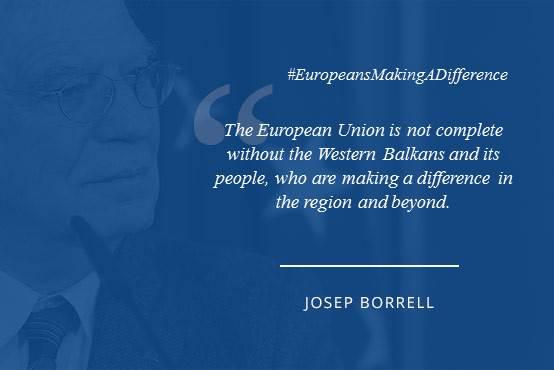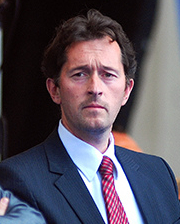Europeans who make a difference and inspire us all
This text is previously published on the EEAS website.
During my recent visits to the Western Balkans, I had the opportunity to meet exceptional and impressive people from all walks of life. Focus usually lies on my meetings with political leaders. But now I want to highlight the exchanges I had with the people of the region: young activists who want cleaner air and a greener region; women with the drive to achieve our joint European future and who fight for a bigger role in resolving conflicts. I hope all these people with great ideas, expertise, talent and determination will play a significant role in advancing the EU accession process of the region. They must have this role, if this process is to succeed.

Our policies often sound complicated, but in essence they are not. Joining the EU means ‘building the EU at home’: in Albania, Bosnia and Herzegovina, Montenegro, Serbia, Kosovo and North Macedonia. The success of our Western Balkan partners in ‘building the EU at home’ does not only depend on the performance of governments and EU institutions. While this is essential, the real success depends on the engagement of the people in these societies, on the actions of citizens, shaping the society in which they and their children can prosper.
In this context, I am very proud of our recent campaign dedicated to the people of the Western Balkans, called Europeans making a difference.
This campaign does exactly this: it gives a platform to people – in this case women of the Western Balkans – who move boundaries, who inspire and open doors for others.
In our work we come across ‘Europeans who make a difference’ every day. With this campaign, we want to highlight their stories not just because they are good, genuine human stories. But also because their stories are not known enough in our EU Member States, and not visible enough in the Western Balkans either.
If fame is important in the age of social media, if fame is power – and experts say it is – then we want scientists to be famous and influential. We want people who fight for equal societies to be famous, as well as those who support entrepreneurship and make people thrive. We want champions who feel a duty to give back to be famous, as well as exceptional artists who stand for what is right – all building societies in which there will be no limits for anybody. And speaking of limits, there are none for determined young women like Mrika from Kosovo who decided to climb the Seven Summits, the highest peaks on every continent, before the age of 18, and then she did it!
I have said it many times, and will repeat again: the EU is not complete without the Western Balkans. To complete the EU, make it stronger and more prosperous, we need people like our campaign protagonists Selma Prodanović from Bosnia and Herzegovina, Nataša Kovačević from Serbia, Tamara Todevska from North Macedonia, Detina and Argita Zalli from Albania, Mrika Nikçi from Kosovo, Maja Raičević from Montenegro.
We are well aware of the challenges in the Western Balkans and the transformations that need to happen to ‘build the EU at home’. People featured in our campaign are indispensable for those transformations and for inspiring others to participate. Their knowledge and contribution are necessary for ‘building the EU’ in the Western Balkans.
Their stories are reminding me of why the EU accession path of the Western Balkans is so important for all of us in Europe. The process is about and for the people.
And, this process needs to succeed – in the best interest of all people in Europe.

























